Depending on species, profile and any pre-treatments, expect to pay in the region of £50–£100 per m² for a quality timber cladding solution.
Your project cost will be even higher if you require professional installation (which is in the region of £200 per day, typically).
For a more precise estimation, explore our range of cladding and get in touch with our team – or keep reading for a little more detail!
Step 1: Find out how much cladding you need (and account for waste)
Firstly, calculate the area you’re wanting to clad in square metres (m²). With square and rectangular spaces, this is done simply by multiplying together the wall dimensions. Be sure to subtract the area of any openings like windows or doors.
To avoid running out of material, it’s always wise to account for a little waste (this is largely the result of cutting and trimming losses). We’d recommend an extra 10% on top. So, once you’ve calculated the area of the surface with openings subtracted, multiply your figure by 1.1.
Let’s take the example of a typical small garden room with an 8’ bifold door.
- Longer wall 1 – 2.2m height × 3.8m width = 8.36m²
- Longer wall 2 – 2.2m × 3.8m = 8.36m²
- Shorter wall 1 – 2.2m × 2.4m = 5.28m²
- Shorter wall 2 – 2.2m × 2.4m = 5.28m²
This totals 27.28m², and after subtracting the bifold door (2.1m × 2.4m = 5.04m²), you have 22.24m². Multiply by 1.1 to account for 10% waste and you arrive at your final figure – 24.5m².
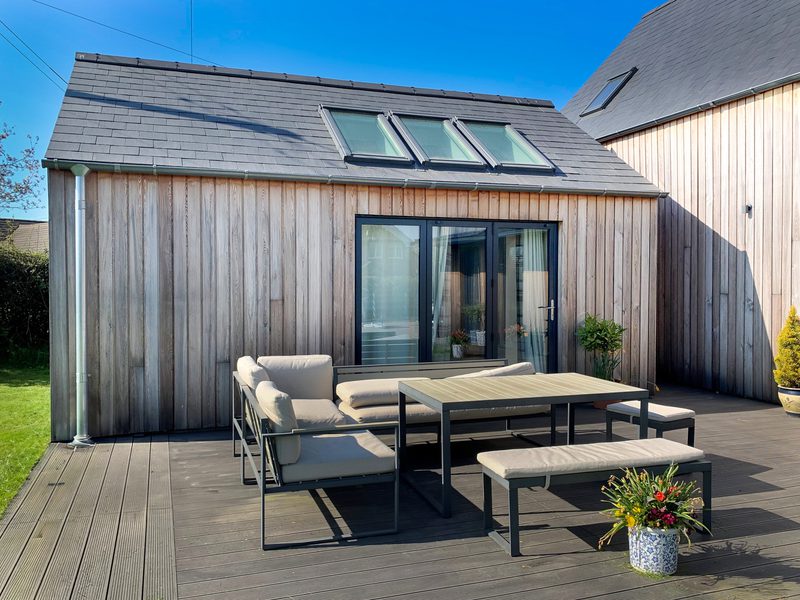
If you’re cladding inside a gable end (such as the one below), then use the following formula: 0.5 × base × height
A gable with a base width of 6m and vertical height of 2.5m has an area of 7.5m². This comes to 8.25m² with 10% waste accounted for.
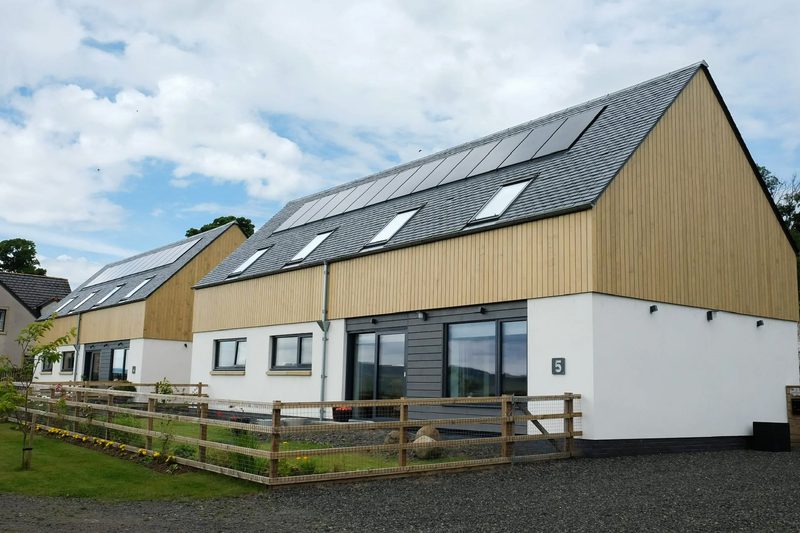
The number of lengths of cladding required to accommodate a certain amount of square feet varies from profile to profile. Our team is always on hand to iron out any finer details — just give us a message.
Step 2: Choose a timber species, profile and treatment
The type of cladding you choose also affects your project cost.
Species
For their beauty, outdoor durability and dimensional stability, softwoods like western red cedar (~£55 per m²), Siberian larch (~£65 per m²) and Douglas fir (~£45 per m²) are commercially popular. When it comes to hardwoods, European oak (~£60 per m²) is a sought-after timber.
Thermally-modified woods like Thermo-Ayous (~£45 per m²), Thermo-Nordic Pine (~£30 per m²) and Thermo-Tulipwood (~£60 per m²) are attracting more admirers for their sustainability, outdoor durability and tropical mid-dark brown tones. Accoya® (~£95 per m²), a non-toxic chemically-modified timber, is yet another popular and high-performance solution.
Profile
This is the shape that each cladding board is machined to and determines how they fit together. Popular examples include tongue and groove V-joint, shadow gap, square edge ‘open’, rainscreen and feather edge.
Profile has some impact on price. For example, in a narrower tongue and groove V-joint profile (such as our DTC2), western red cedar costs around £52 per m². With a wider board (DTC3), it costs £63.
Vertical oriented shadow gap is similar, just with a slightly higher cost due to the more complex design – western red cedar in our narrower profile (DTC14) is £57. With a wider board (DTC15), it is £67.
Feather-edge is typically a more expensive profile. In our DTC25 profile, western red cedar costs approximately £67 per m².
The reason wider boards are more expensive is because they can require a higher-quality cut to avoid defects.
Pre-treatment
It’s possible to leave timber cladding without any treatment, but you can enhance its outdoor performance and impact its colour by selecting a factory pre-treatment. These treatments include SiOO:X, charred look, UV protectants and even fire retardants.
Choosing one of these can add around £20-30 per m² to the cost of your timber cladding product.
Prices listed in this article do not include VAT, are accurate as of the time of writing (May 2025) and are subject to change.
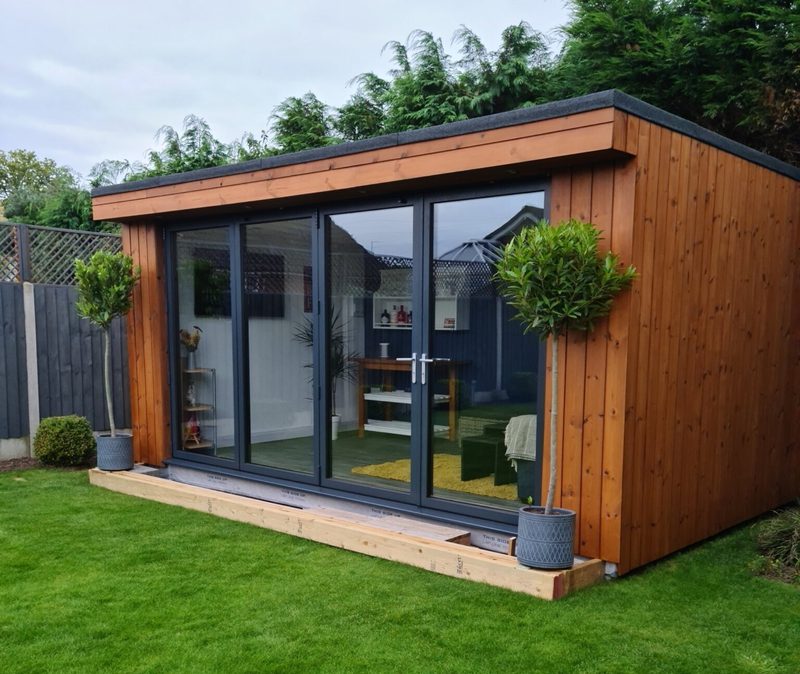
Step 3: Multiply your area by the cost per m² of your product
Multiply the amount of cladding required by the cost per m² of the cladding product you like.
Using the small garden room example mentioned earlier (which required 24.5m² of cladding), a tongue and groove V-joint profile will cost in the region of:
- Western red cedar – ~£1,275 + VAT (£52 + VAT per m²)
- Siberian larch ‘B’ grade – ~£1,100 + VAT (£45 + VAT per m²)
- Siberian larch ‘A’ grade – ~£1,350 + VAT (£55 + VAT per m²)
- Alaskan yellow cedar – ~£1,225 + VAT (£50 + VAT per m²)
- Douglas fir – ~£1,100 + VAT (£45 + VAT per m²)
- Thermo-Ayous – ~£1,100 + VAT (£45 + VAT per m²)
- Thermo-Tulipwood – ~£1,590 + VAT (£65 + VAT per m²)
- Thermo-Nordic Pine – ~£685 + VAT (£28+ VAT per m²)
Top tip: did you know that choosing a wider cladding board (with a greater cover size) can reduce your costs?
Step 4: Add in any installation costs
Unless you’re going down the DIY route, hiring a cladding installation specialist will cost approximately £150–250 per day. Your installer may prefer to charge per m².
Again, every project is different. Cladding a large house or complex commercial project may require scaffolding and take several days, for example. A trades team will be able to provide a more concrete quotation.
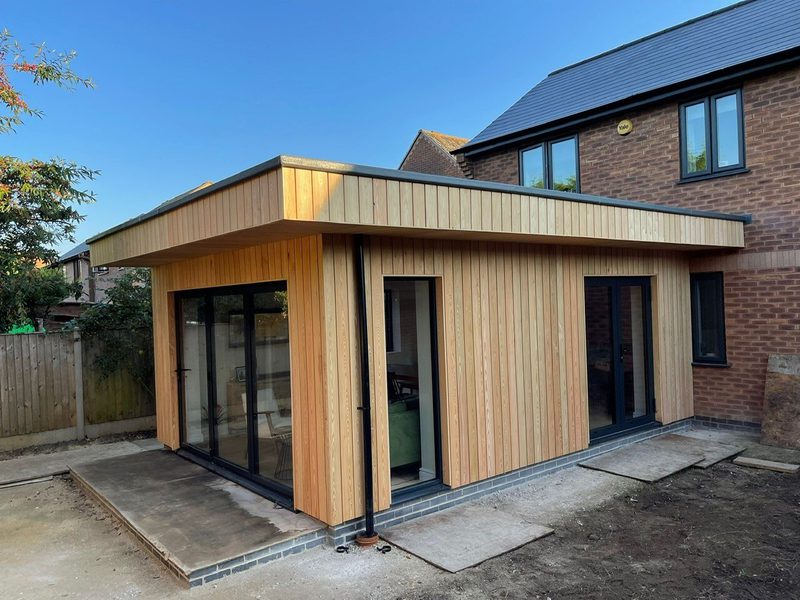
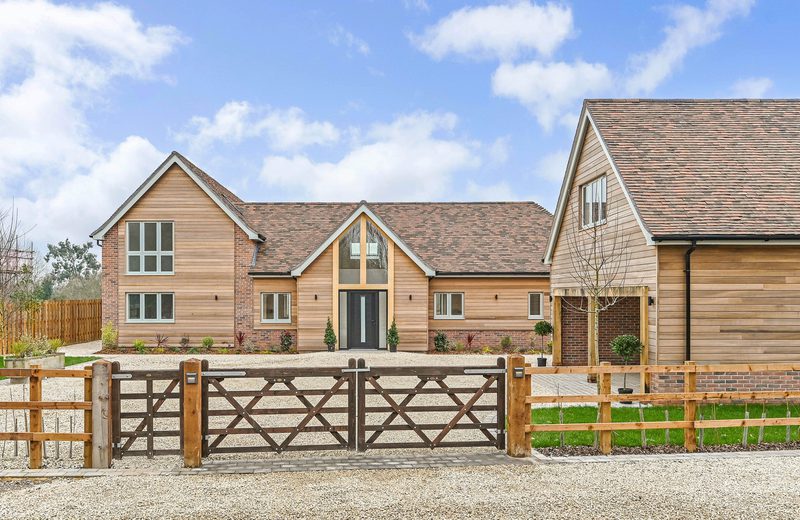
Start your timber cladding project today
Cladding your shed, garden room, house or even a commercial project? Explore our range of quality timber cladding.
Sustainably imported from across the world, we offer the choice of many stunning, high-performance timber species, all machined to profile at our factory in Yorkshire.
We work with home improvers, architects, tradespeople and DIYers on projects of all sizes. To start yours, click the button below.
Get in touch with our team
